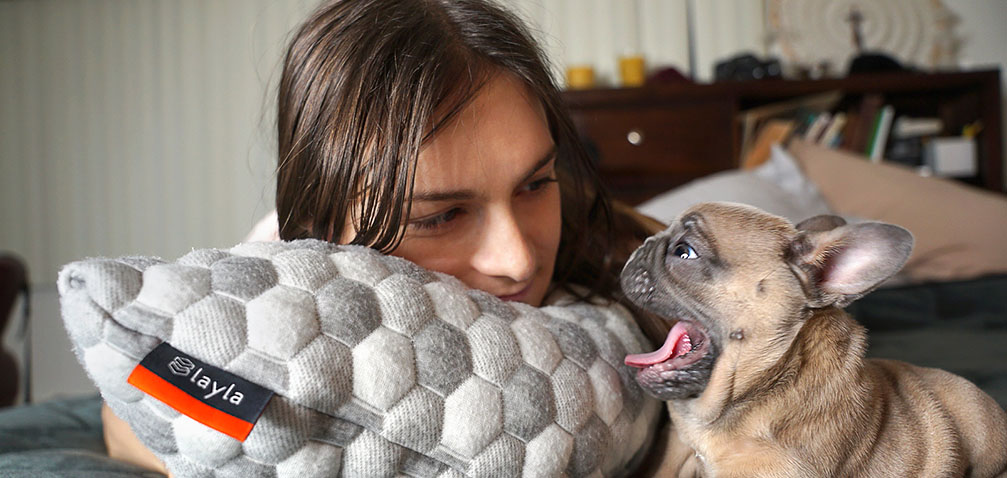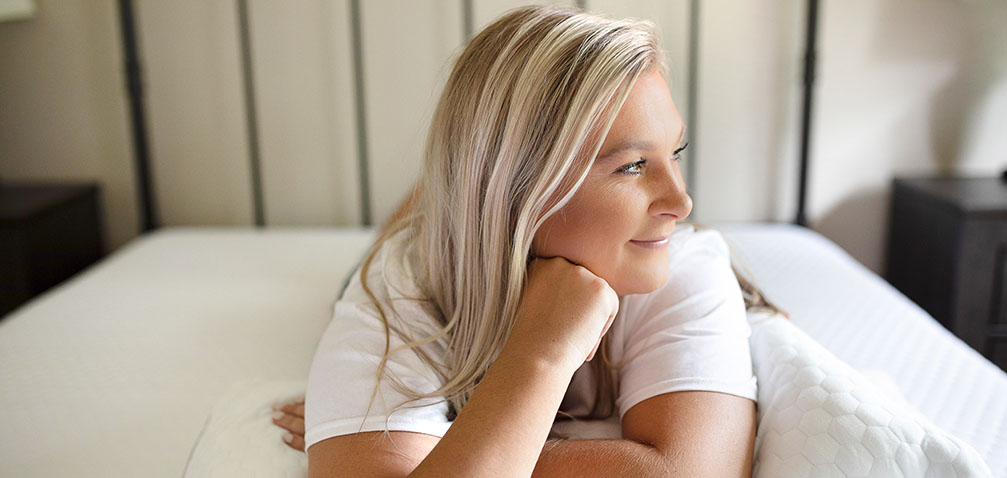- How Does Sleep Affect Athletic Performance?
- How Does Sleep Affect Recovery?
- How Does Sleep Affect Your Diet?
- Can Exercise Improve Sleep?
- When Should You Exercise?
- Tips to Improve Sleep
- Wrapping Up: Importance of Sleep in Fitness
How Does Sleep Affect Athletic Performance?
Exercise and sleep go hand-in-hand. You can’t have one without the other. The importance of sleep for fitness extends beyond lifting weights at the gym. Sleep affects your athletic performance in several ways. Some people can get through their day on minimal sleep every now and then. However, others need regular sleep routines to get anything done, including exercise. Quality sleep can enhance your athletic performance in several ways, including the following:
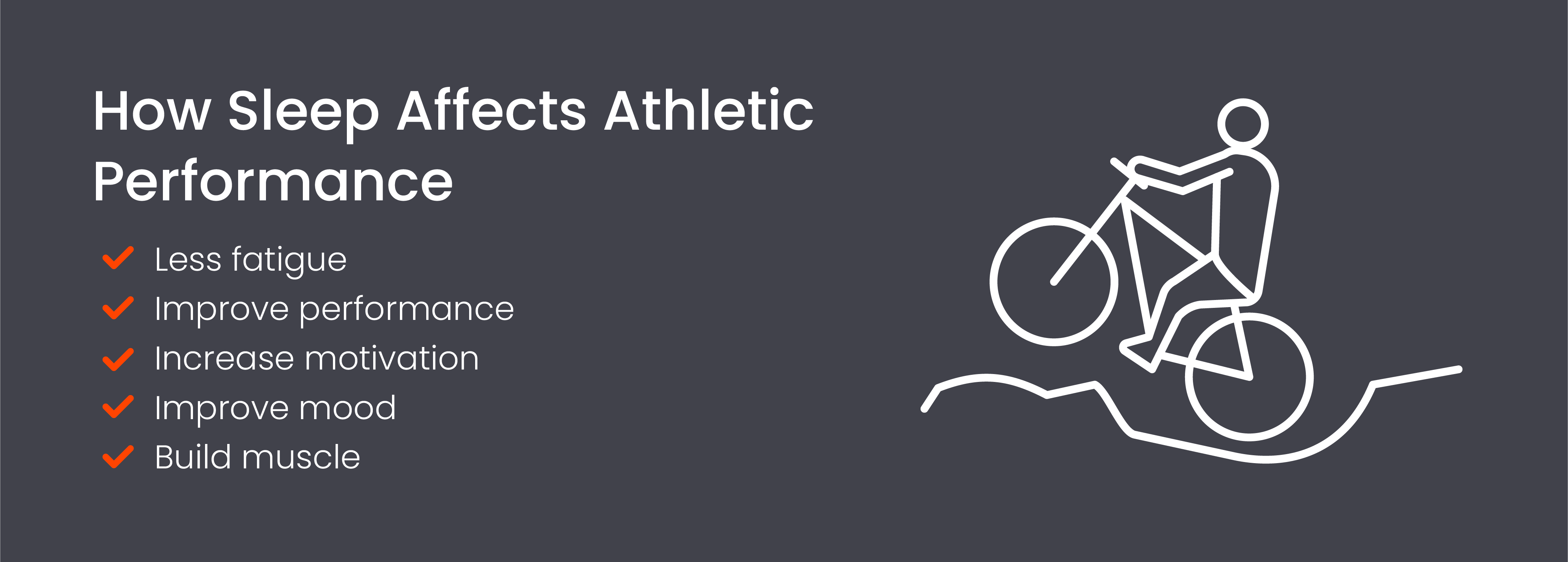
- Less fatigue: Better sleep means less fatigue throughout the day, so your body and mind won’t tire out as quickly. The better rested you are, the better your body will function, whether running a marathon or on the elliptical at the gym.
- Improve performance: When you’re less tired, you have more endurance, which means you can accomplish more during your physical training. When you don’t sleep well, every aspect of your body, including your muscles, will tire faster, so if you want to improve your athletic performance, you’ll need better sleep.
- Increase motivation: How motivated do you feel to do anything when you’re tired? Most people can’t focus when they don’t get enough sleep, affecting everything from work to athletic performance. A recent study on exercise to improve sleep in insomnia demonstrated that participants with better sleep were more likely to exercise the following day.
- Improve mood: When you’re stressed or in a bad mood, you don’t want to exercise, and that’s understandable. However, when you’re in a good mood, you feel more motivated to hop on the treadmill or pick up your weights. Exercise not only improves your mood, but your mood improves exercise by making you feel more energized and motivated.
- Build muscle: During sleep, your body can rest and repair from the day. Sleep is incredibly important for building muscle because if your muscles don’t get enough time to rest, they can’t grow bigger and stronger.
How Does Sleep Affect Recovery?
Most people know the importance of rest or recovery days when training. The rest day is crucial to improving performance and preventing injury. However, quality sleep is essential for recovery because it allows the body to repair and build muscles, reducing recovery times. Sleep quality before and after exercise impacts your body’s ability to recover. Here are just a few ways better sleep can improve recovery:

- Repair and build muscles: Quality sleep allows your body to repair and recover. Poor sleep is associated with poor athletic performance because your muscles must repair and recover properly. During deep sleep, your body begins to restore itself. More blood is available for the muscles, allowing them to get extra oxygen and nutrients to facilitate growth and healing. When you don’t get quality sleep, your sleep cycle might get disrupted, preventing you from entering the stages of sleep required for muscle repair and building.
- Improve recovery: Quality sleep can improve muscle recovery to reduce the recovery period overall, which means you can get back in the gym faster. Sleep allows your muscles to get the oxygen and nutrients they need to heal, and they’ll heal faster when you get better quality sleep with fewer disruptions throughout the night. On the flip side, poor sleep quality can prevent your muscles from recovering as quickly, which means you can experience soreness and more pain.
- Increase energy levels: Quality sleep gives you enough energy to make it through the day no matter what you’re doing. So, whether you’re going for an early morning jog or doing afternoon yoga on your lunch break, the energy you get from a good night of sleep can help you recover faster and give you the boost of energy you need to get back in the gym.
How Does Sleep Affect Your Diet?
The importance of sleep for fitness and overall health is well documented, but did you know that sleep can affect your diet and vice versa? Sleep, diet, and fitness are all interconnected and essential for your overall health and wellness. For example, a recent study conducted by Northwestern University concluded that sleep deprivation makes you seek out unhealthier foods. In the study, participants changed their food choices after sleeping for only four hours, looking for foods with higher calories, like potato chips and other junk food.
But what does this have to do with fitness? Like sleep, diet plays a crucial role in fitness. For example, if you don’t get enough sleep, you may eat nothing but highly-processed foods the next day because your body craves high-energy-dense foods. These dietary choices can make you feel lethargic, while the lack of sleep can make you feel less motivated to work out.
Food is the fuel for a workout. Therefore, you won’t have as much energy if you eat a poor diet because your body lacks the essential nutrients it needs. But unfortunately, poor sleep can leave you reaching for junk food even early in the morning, affecting your ability to work out.
Can Exercise Improve Sleep?
The relationship between sleep and fitness extends beyond improving athletic performance; while sleep can improve exercise, exercise can also improve sleep. Exercise impacts sleep in many ways, including the following:
- Can improve mood: Exercise boosts endorphins, which are happy hormones that can improve your mood. Of course, being happy doesn’t mean you’ll always fall asleep faster, but exercise can reduce stress, which can keep you up at night.
- Reduces sleep onset: Exercise can reduce the time it takes to fall asleep by decreasing excess energy you may have before bedtime. When you decrease the amount of time you wait to fall asleep, you can get more sleep at night and ultimately improve your sleep quality throughout the night.
- Reduces daytime sleepiness: If you’re someone who constantly feels groggy throughout the day, exercise might be able to help. When you feel tired during the day, your body may rest more, which can cause you to build up energy and feel more awake at night. However, when you exercise, you can boost your energy levels during the day. Feeling more awake during the day will help your body understand when it’s time to settle down for the night.
Sadly, exercise can negatively impact sleep in some people, depending on when they exercise. Individuals who exercise at night may experience sleep disruptions because exercise boosts energy levels. You should avoid exercise before sleep because it can make you feel more awake even though you should be getting ready for bed. Of course, this isn’t true for everyone, so you might have to experiment to find the best time to exercise to improve your sleep quality.
When Should You Exercise?
Morning and early afternoon are the best times for exercise to promote better sleep. You should avoid exercising before bed because it can affect your ability to fall asleep. However, everyone is different, so you should find what works best for you. For example, if you don’t have any free time other than right before bed, exercise may actually promote better sleep by helping you expend more energy at the end of the day. However, many people find exercise too close to bedtime disruptive. If exercise at night impacts your ability to fall asleep, consider exercising more than three hours before bedtime.
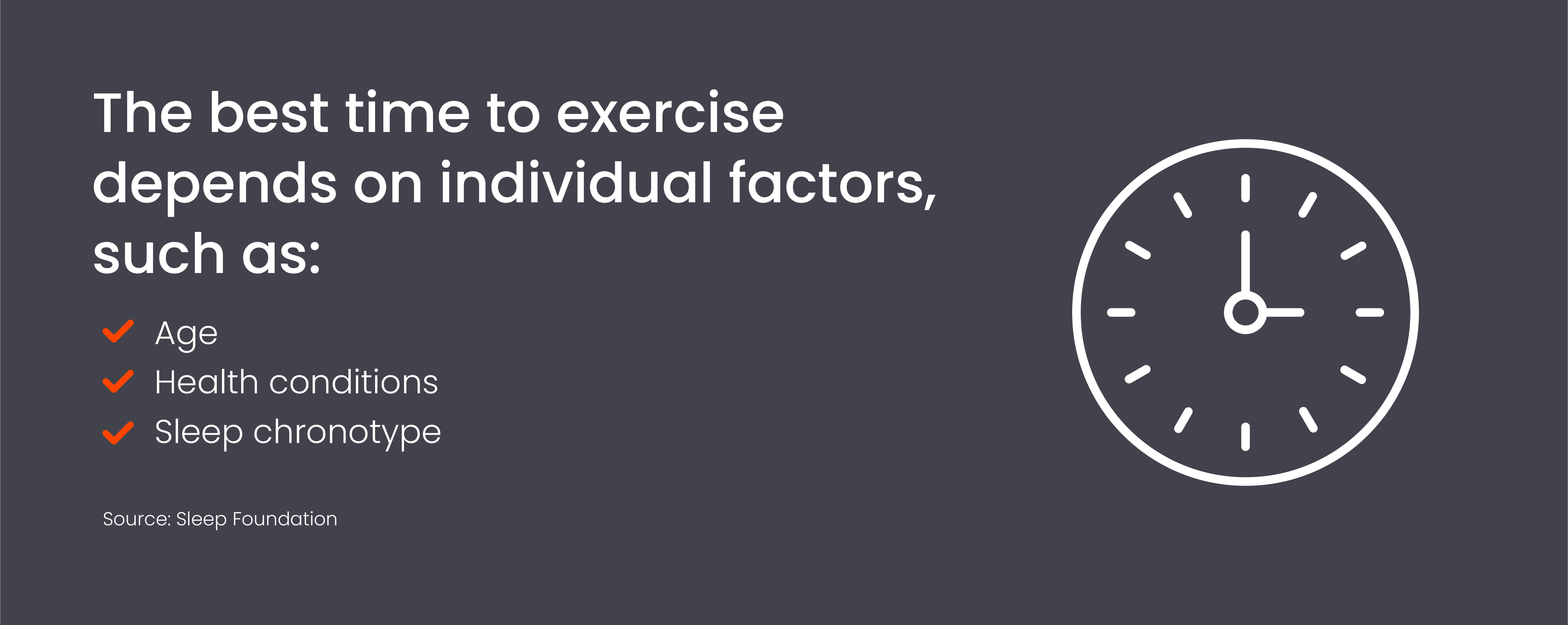
Of course, several other factors can affect when you exercise, including your age, health condition, and sleep chronotype. For example, early birds may be more motivated to work out as soon as they wake up, while night owls may have more energy after the sun goes down.
Tips to Improve Sleep
Sleep can improve athletic performance, and exercise can improve sleep quality. Therefore, getting quality sleep every night is crucial for your overall health and wellness. Of course, exercise isn’t the only thing that can help you fall asleep and stay asleep at night. Here are a few other tips to improve your sleep:
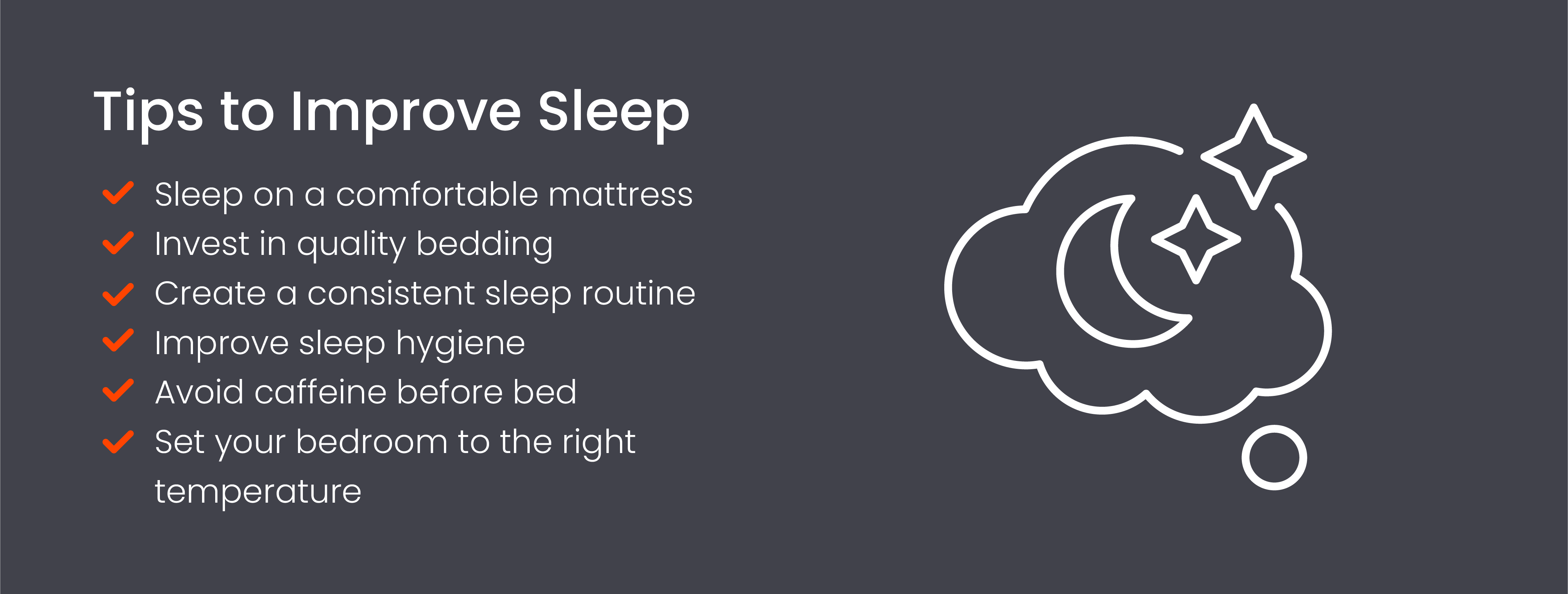
- Sleep on a comfortable mattress: Your mattress is essential to your sleep quality. A lumpy mattress can lead to tossing and turning and aches and pains that make it difficult to sleep throughout the night, leaving you feeling groggy the next day. A comfortable mattress made from breathable materials should be firm enough for your particular sleep position and preferences.
- Invest in quality bedding: While your mattress is important, so are the sheets and bedding you use to make yourself cozy at night. High-quality, breathable sheets are ideal for layering in any season and can help you stay warm without getting too hot while you sleep. In addition, you can use a weighted blanket for muscle recovery to help you get better quality sleep while facilitating healing. Of course, there are many benefits of weighted blankets for improving sleep quality since they can make you feel like you’re being wrapped in a big hug.
- Create a consistent sleep routine: Having a consistent nighttime routine is crucial, so you should fall asleep and wake up at the same time every day, even on weekends. Of course, everyone is different, so you’ll need to determine how many hours of sleep you need and when you should start preparing for bed to ensure you get enough sleep.
- Set your bedroom to the right temperature: Most people can’t sleep when their bedrooms are too hot or cold. Therefore, you should set your thermostat to your ideal sleep temperature before going to bed to ensure you won’t have any disruptions due to the room’s temperature.
Wrapping Up: Importance of Sleep in Fitness
The importance of sleep in fitness is clear; you need quality sleep to improve your athletic performance. Without quality sleep, you may feel less motivated and groggy, and your muscles can’t properly recover, leaving you to spend more time resting instead of spending time in the gym. Unfortunately, far too many people experience sleep problems due to their mattresses.
While your mattress should facilitate sleep, having the wrong mattress or using an old, worn-out mattress can lead to aches and pains while disrupting your sleep throughout the night. Layla’s memory foam and hybrid mattresses make it easy to fall asleep and stay asleep throughout the night to improve your athletic performance.


